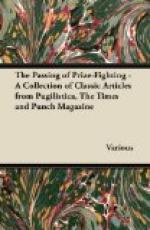A volume of remarkable interest is In Ruhleben (HURST AND BLACKETT), into which Mr. DOUGLAS SLADEN has gathered a variety of information concerning the life of the English civilian prisoners in Germany, its many hardships and few ameliorations. The greater part of the book is filled with a series of letters sent by one of these prisoners to his mother. Perhaps (one suspects) the writer of these was not altogether an ordinary young man. From whatever reason, the fact remains that his letters are by no means uncheery reading; his books and study, most of all his friendships (with one fellow-captive especially), seem to have kept him contented and even happy. Of course some part of this may well have been coloured for the maternal eye; it is clear that he was greatly concerned that she should not be too anxious about him. A more impartial picture of the conditions at Ruhleben is given in the second part of the volume, and in a letter by Sir TIMOTHY EDEN, reprinted from The Times, on The Case for a wholesale Exchange of Civilian Prisoners. I should add that the book is illustrated with a number of drawings of Ruhleben made by Mr. STANLEY GRIMM, an artist of the Expressionist School (whatever that may mean). These are vigorous and arresting, if, to the unmodern eye, somewhat formless. But they are part of a record that all Englishmen can study with quickened sympathy and a great pride in the courage and resource of our race under conditions needlessly brutal at their worst, and never better than just endurable.
* * * * *
Nothing will ever persuade me that This Way Out (METHUEN) is an attractive title for a novel, however effective it may be as a notice in a railway station. The book itself, however, is intriguing in spite of its gloominess. The grandfather of Jane and John-Andrew Vaguener committed a most cold-blooded murder—this in a prologue. Then, when we get to the real story, we find Jane tapping out popular fiction at an amazing pace, and her brother, John-Andrew, living on the proceeds thereof. Jane is noisy, vulgar, and successful in her own line, and gets on John-Andrew’s nerves; and when he discovers that she has for once turned aside from tawdry fiction and written a play that is really good he decides that he can stand it and




